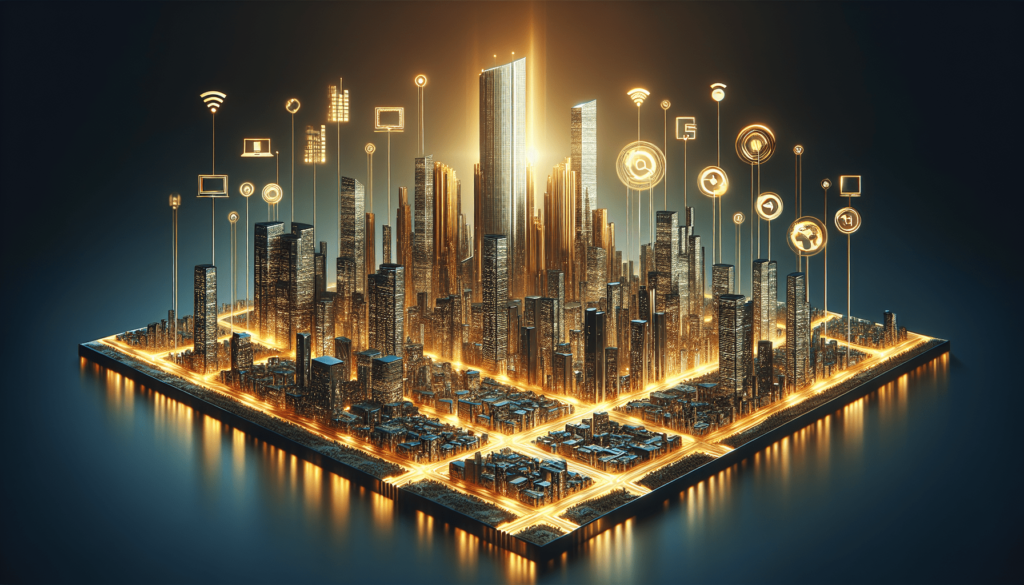Welcome to an exciting article all about the integration of gold in smart cities! Gold, often seen as a symbol of wealth and luxury, is now being utilized in innovative ways to make our cities smarter and more sustainable. From enhancing the aesthetics of city landscapes to improving technology through its conductivity properties, gold is proving to be a valuable resource in the development of modern urban spaces. Let’s delve into the various ways in which gold is being integrated into the infrastructure of smart cities and how it is shaping the cities of the future. Have you ever wondered how gold could play a role in the development of smart cities? You may be surprised to learn about the various applications and benefits of integrating gold into modern urban environments. In this article, we will explore the fascinating world of gold in smart cities and how this precious metal is shaping the future of urban living.

The Role of Gold in Smart Cities
Gold may not be the first material that comes to mind when you think of smart cities, but its unique properties make it a valuable asset in urban development. From its conductivity to its corrosion resistance, gold offers a wide range of benefits that can be leveraged in the creation of efficient and sustainable urban environments.
Conductivity of Gold
Did you know that gold is one of the most conductive metals on the planet? Its high conductivity makes it an ideal material for use in electronics and telecommunications, which are essential components of smart cities. By incorporating gold into various devices and infrastructure, cities can improve connectivity and communication systems, leading to more efficient and reliable services for residents.
Corrosion Resistance
Another key benefit of gold is its exceptional corrosion resistance. In environments where exposure to moisture and chemicals is common, such as urban infrastructure, this property of gold can significantly extend the lifespan of components and reduce maintenance costs. By using gold-plated materials in critical infrastructure, smart cities can ensure greater durability and longevity.
Applications of Gold in Smart Cities
The integration of gold in smart cities goes beyond its physical properties; it also encompasses a wide range of applications and use cases that contribute to the overall development of urban environments. From energy generation to waste management, gold plays a crucial role in various aspects of city living.
Energy Generation
Renewable energy sources, such as solar panels and wind turbines, are essential components of sustainable smart cities. Gold is used in the production of these energy-generating systems due to its high conductivity and durability. By harnessing the power of gold, cities can generate clean energy more efficiently and reduce their carbon footprint.
Advanced Healthcare Technologies
The healthcare sector is another area where gold plays a vital role in smart cities. From diagnostic tools to treatment methods, gold nanoparticles are being used in innovative ways to improve patient care and outcomes. By incorporating gold-based technologies into healthcare systems, cities can enhance the quality of medical services and promote healthier urban populations.
Smart Waste Management
Efficient waste management is crucial for maintaining the cleanliness and sustainability of smart cities. Gold sensors and detectors are used in waste sorting facilities to identify and separate valuable materials from non-recyclable waste. This technology not only reduces the amount of waste sent to landfills but also allows for the recovery of precious resources, such as gold, silver, and other metals.
Challenges and Limitations of Using Gold in Smart Cities
While gold offers numerous benefits and applications in smart cities, there are also challenges and limitations that must be considered when integrating this precious metal into urban environments. From cost constraints to environmental concerns, cities must carefully weigh the pros and cons of using gold in their development projects.
Cost Considerations
One of the primary challenges of using gold in smart cities is the cost associated with this precious metal. Gold is a valuable commodity with a high market price, making it an expensive material for large-scale projects. Cities must balance the benefits of using gold against the financial implications to ensure that their development plans are both sustainable and cost-effective.
Environmental Impact
Another factor to consider when integrating gold into smart cities is its environmental impact. Mining and refining gold can have detrimental effects on ecosystems and communities, leading to pollution and resource depletion. Cities must prioritize sustainable sourcing and recycling methods to minimize the environmental footprint of using gold in their infrastructure and technologies.
Future Trends in Gold Integration in Smart Cities
As technology continues to advance and urban populations grow, the integration of gold in smart cities is expected to evolve and expand in the coming years. From enhanced connectivity to improved resource management, cities will leverage the unique properties of gold to create more resilient and sustainable urban environments.
Enhanced Connectivity and Communication
With the rise of 5G networks and Internet of Things (IoT) devices, connectivity and communication will play a crucial role in the development of smart cities. Gold’s conductivity and reliability will be essential for powering these advanced technologies and ensuring seamless communication between devices and systems. As cities become more interconnected, the demand for gold in telecommunications infrastructure will only continue to grow.
Sustainable Urban Development
Sustainability is a top priority for smart cities aiming to reduce their environmental impact and improve quality of life for residents. Gold will play a key role in achieving these goals by enabling clean energy generation, efficient waste management, and eco-friendly transportation systems. By integrating gold into sustainable urban development projects, cities can create a more resilient and environmentally conscious future for their communities.
In conclusion, the integration of gold in smart cities presents a unique opportunity to harness the valuable properties of this precious metal for the benefit of urban populations. From its conductivity to its corrosion resistance, gold offers a wide range of benefits that can be leveraged in various aspects of city living, including energy generation, healthcare, and waste management. However, cities must also consider the challenges and limitations of using gold, such as cost constraints and environmental impact, to ensure that their development projects are both sustainable and effective. Looking ahead, future trends in gold integration in smart cities point towards enhanced connectivity, sustainable urban development, and a more resilient future for urban environments. As technology and urbanization continue to advance, the role of gold in shaping the cities of tomorrow will only become more prominent and impactful.


